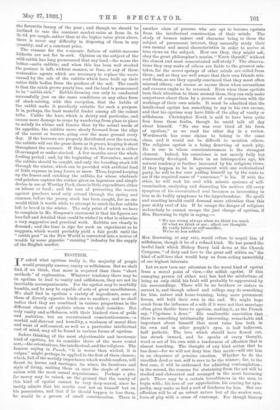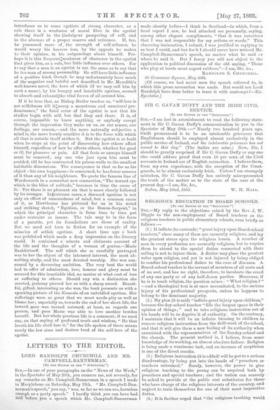EGOTISM.
IF asked what egotism really is, the majority of people would promptly answer, vanity or selfishness. But we shall find, if we think, that more is required than these "short methods" of explanation. Whatever tendency there may be tin egotism to lead to vanity and selfishness, they are not its inevitable accompaniments. For the egotist may be morbidly humble, and be may be capable of acts of great unselfishness. We shall find in egotism a variety of ingredients, some of them of directly opposite kinds one to another; and we shall notice that they are combined in various proportions in the -different classes of egotists whom we shall consider. Not -only vanity and selfishness, with their kindred vices of pride and ambition, but an overstrained conscientiousness,—a morbid self-distrust and humility, a weakness of moral fibre and want of self-control, as well as a particular intellectual cast of mind, may all be found in various forms of egotism.
Before thinking of the most objectionable and inveterate kind of egotists, let is consider three of the more venial sort,—the ostentatious, the intellectual, and the religious. The famous saying in Punch, "it is worse than wicked, it is vulgar," might perhaps be applied to the first of these classes ; which, full of the worldly importance which wealth confers, will flaunt its. horses and carriages, its wines, its furniture and style of living, making them at once the staple of conver- sation with the most casual acquaintance, Perhaps a plea for mercy may be raised, on the ground that the vanity of this kind of egotiet cannot be very deep-seated, since he tacitly admits that his merits rest not on himself but on his possessions, and that if he should happen to lose them, he :would be a person of small consideration. There is another class of persons who are apt to become egotists from the intellectual construction of their minds. The study of human nature and character being to them the subject of paramount interest, they naturally study their own mental and moral characteristics in order to arrive at true views on the subject. How can they, they might ask, obey the great philosopher's maxim, " Know thyself," without the closest and most concentrated self-study ? The observa- tions they may make of others are liable to the grossest mis- takes, for the secret springs of other minds are veiled from them ; and as they are well aware that their own friends mis- read them, so are they equally convinced that they must often misread others, ; nd accuse or excuse them when accusations and excuses ought to be reversed. Even when these egotists turn their attention to those around them, they can only make conjectures about them by a process of comparison with the workings of their own minds. It must be admitted that the intellectual egotist has something to say in his own excuse, and that his egotism may have little of the alloy of vanity or selfishness. Christopher North is said to have been quite free from these faults, though he could talk all day about himself. "No one was ever tired of his form of egotism," as we read the other day in a review. Wordsworth, has some claims to belong to the same class, and it would not be difficult to mention others. The religious egotist is a being deserving of much pity. He is one in whom conscientiousness is the strongest element. Indeed, his conscience is not merely fully but abnormally developed. Born in an introspective age, his natural tendency is further increased by his religious views. If they happen to be in agreement with one ecclesiastical party, he will be for ever pulling himself up by the roots to see if the required sense of " assurance " is his, If with the other, he will rack his soul with minute systems of self- examination, analysing and dissecting his motives till every symptom of his overstrained soul becomes as interesting to him as do bodily symptoms to the hypochondriac. No spoilt and exacting invalid could demand more attention than this poor sickly soul of his. If he escape the danger of religious melancholy he cannot escape the just charge of egotism, if Mrs. Browning be right in saying :— " We are wrong always when we think too much Of what we think or are : albeit our thoughts Be verily bitter as self-sacrifice,
We're no less selfish."
Mrs. Browning, at any rate, would refuse to acquit him of selfishness, though it be of a refined kind. He has passed the lawful limit which Bishop Barry laid down at the Church Congress, "of duty and love to the great self within us," the kind of self-love that would keep us from acting unworthily of our highest interests.
Let us now turn our attention to the worst kind of egotist from a moral point of view,—the selfish egotist. If this annoying person (of either sex) has had the misfortune of being an only child, his fault will probably be aggravated by his surroundings. There will be no brothers or sisters to correct it, and though school and college may do something for him, nature and home-training, being more permanent forces, will hold their own in the end. We might hope much from the influence of a wife if it were not that marriage often gives double force to egotism, making it, as the French say, " l'egoisme h deux." His unalterable conviction that there is something intrinsically interesting, remarkable and important about himself that must raise him both in his own. and in other people's eyes, is half ludicrous, half pathetic. The love which should have flowed out, has struck inward, and he speaks of every thought, word or act of his own with a tenderness of affection that is almost touching. The thought of any kind action that he has done—for we will not deny him that merit—will stir him to an eloquence of genuine emotion. Whether he do the unselfish deed or not, self is sure to be the winner; for, in the first case, it will be enthroned for admiring contemplation ; in the second, the reasons for abstaining from the act will be studied and elaborated and arranged in the most becoming garb. There may be a certain loveableness in the man, to begin with ; his love of our approbation, his craving for sym- pathy, may make us feel a sort of fondness for him. But our affeetion will be of no robust nature but of the weaker sort, born of pity with a cross of contempt. For though history introduces us to some egotists of strong character, as a rule there is a weakness of moral fibre in the egotist showing itself in the (indulgent pampering of self, and in the absence of a proper reserve and reticence. If, too, he possessed more of_ the strength of self-reliance, be would weary his hearers less, by the appeals he makes to their opinion, in his outpourings about himself. Per- haps it is this frequent:weakness of character in the egotist that gives him, as a rule, but little influence over others. For t3 say that a man is an egotist is not the same as to say that he is a man of strong personality. He will have little influence of a positive kind, though he may unfortunately have much of the negative and baleful sort described in Mr. Meredith's well-known novel, the hero of which (if we may call him by such a name), by his hungry and insatiable egotism, seemed to absorb and exhanstithe vital forces of all around him.
If it be true that, as Bishop Butler teaches us, self-love is not selfishness till it:usurp a monstrous and unnatural pre- dominance," the fatal error of the egotist is not that his studies begin with self, but that they end. there. It is, of course, impossible to know anything or anybody except through the impression they make on us, on our senses, our feelings, our reason,--and the more naturally subjective a mind is, the more keenly sensitive it is to the force with which all that is outside itself strikes it, But the egotist is at fault when he stops at the point of discovering how others affect himself, regardless of how he affects others, whether for good or ill, for pleasure or pain. All that frets or annoys himself must be removed; any one who jars upon him must be avoided, till he has contracted his prison-walls to the smallest habitable dimensions. The consequence is that so far as his object —his own happiness—is concerned, he has fewer sources of it than any of his neighbours. To quote the famous line of Wordsworth in a somewhat new connection, "The inward eye which is the bliss of solitude," becomes in time the curse of it. For there is no pleasant sin that is more closely followed by its avenger. Intextreme cases, a diseased egotism is not only an effect of unsoundness of mind, but a common cause of it, as Hawthorne has pictured for us in his weird and striking sketch, "Egotism, or the Bosom-Serpent," in which the principal character is from time to time put under restraint as insane. The tale may be in the form of a parable, yet its foundations are those of reality. But we need not turn to fiction for an example of the miseries of selfish egotism. A short time ago a book was published which made a deep impression on the literary world. It contained a- minute and elaborate account of the life and the thoughts of a woman of genius,—Marie Bashkirtseff. The self which she so carefully portrayed was to her the object of the intensest interest, the most ab- sorbing study, and the most devoted worship. She was con- sumed by a devouring ambition. The very best the world had to offer of admiration, love, honour and glory must be secured for this insatiable idol, no matter at what cost of loss or suffering to others. Should any win a distinction she coveted, jealousy pierced her as with a sharp sword. Beauti- ful, gifted, interesting as she was, the book presents us with a speaking picture of the Nemesis of an unbridled egotism. Her sufferings were so great that we must needs pity as well as blame her; especially as, towards the end of her short life, the inward gaze was turned outward, at least, as regards one person, and poor Marie was able to love another besides herself. But her whole previous life is a comment, if we need one, on that saying of profound truth and wisdom, " He that loveth his life shall lose it," for the life spoken of there means surely the low aims and desires bred of the self-love of the egotist.



































 Previous page
Previous page